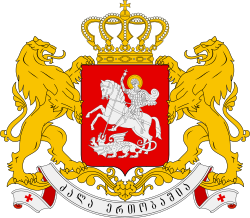| | |||||||||||||||||||||||||||||||||||||||||||||||||
| |||||||||||||||||||||||||||||||||||||||||||||||||
150 of the 235 seats in Parliament 113 seats needed for a majority | |||||||||||||||||||||||||||||||||||||||||||||||||
This lists parties that won seats. See the complete results below.
| |||||||||||||||||||||||||||||||||||||||||||||||||
 |
|---|
Parliamentary elections were held in Georgia on 28 March 2004. [1] They followed the partial annulment of the November 2003 parliamentary elections, which were widely believed to have been rigged by the former President Eduard Shevardnadze. New elections for the 150 seats elected by proportional representation were ordered following the resignation of Shevardnadze and the election of new president Mikhail Saakashvili in January 2004. The results of the 75 seats elected in single-member constituencies in 2003 were not annulled.
Contents
The elections were won by the National Movement–Democrats, which won 135 of the 150 proportional seats, giving it control of 153 of the 235 seats. [2]

